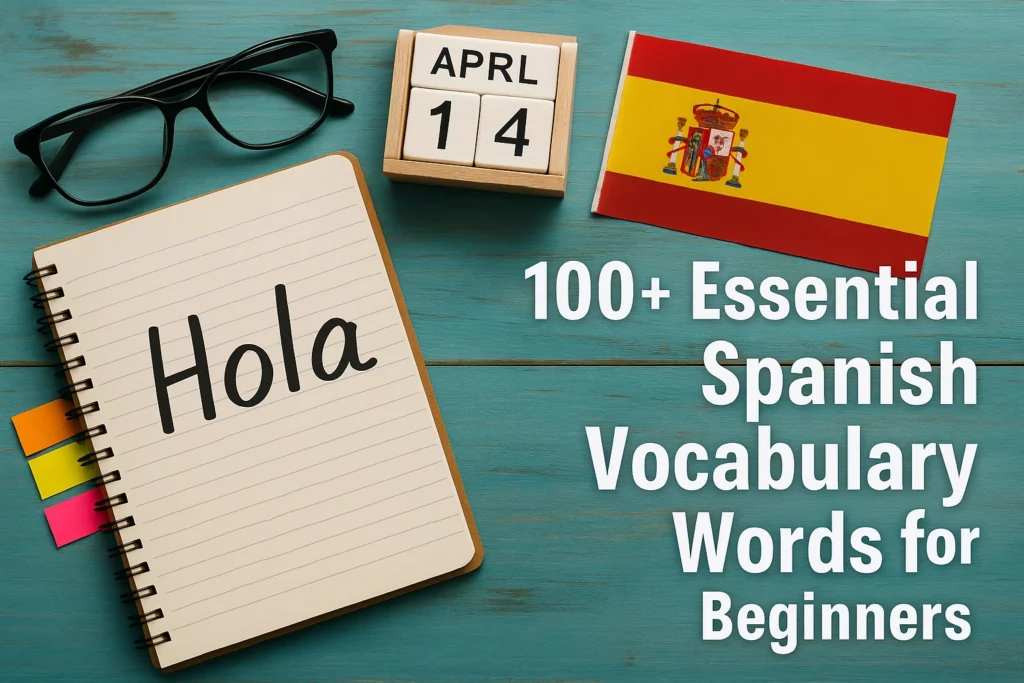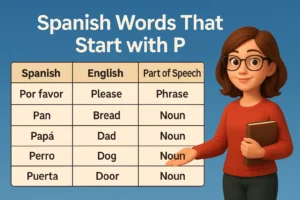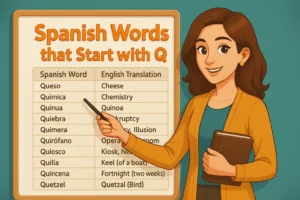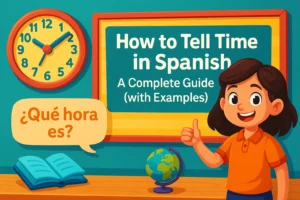
Welcome to our friendly Spanish classroom! If you’re here, you’re probably eager to dive into Spanish vocabulary and master some essential Spanish vocabulary words. Don’t worry if you’re brand new—learning a new language should be fun, engaging, and easy to grasp. And guess what? You’re exactly in the right place.
Think of me as your friendly teacher who’s excited to guide you through this journey step by step. Together, we’ll uncover the basic Spanish vocabulary words that native speakers use daily. From greetings and numbers to food, transportation, and professions—we’ll cover everything that matters!
Ready to start? Let’s go!
100+ Basic Spanish Words: Essential Guide for Beginners
Let’s start with a quick warm-up. Here’s a handy table with some basic Spanish vocabulary words every beginner must know. These words will lay a solid foundation, helping you speak and understand simple conversations right away.
| Spanish Word | English Translation |
| Hola | Hello |
| Adiós | Goodbye |
| Gracias | Thank you |
| Por favor | Please |
| Sí | Yes |
| No | No |
| Perdón | Excuse me/Sorry |
| Lo siento | I’m sorry |
| ¿Qué? | What? |
| ¿Quién? | Who? |
| ¿Dónde? | Where? |
| ¿Cuándo? | When? |
| Bien | Well/Good |
| Mal | Bad |
| Casa | House |
| Amigo | Friend |
| Familia | Family |
| Comida | Food |
| Agua | Water |
| Baño | Bathroom |
| Dinero | Money |
Quick Teacher Tip: Try repeating each word aloud. Pronunciation practice is key to building your confidence and making these Spanish vocabulary words stick!
20 Most Used Spanish Words
As your friendly teacher, let me share a secret with you: to become conversational quickly, learning the most commonly used Spanish vocabulary words is extremely helpful. Did you know that a small set of words makes up the majority of spoken Spanish? Let’s dive into these essential words right away!
Here are the top 20 most frequently used Spanish words with their English translations:
| Spanish Word | English Translation |
| el/la | the |
| de | of/from |
| que | that/which |
| y | and |
| a | to/at |
| en | in/on |
| un/una | a/an |
| ser | to be |
| se | oneself |
| no | no/not |
| haber | to have (auxiliary verb) |
| por | for/by |
| con | with |
| su | his/her/their |
| para | for/in order to |
| como | as/like |
| estar | to be (state/location) |
| tener | to have (possess) |
| le | him/her (indirect obj.) |
| lo | it/him (direct obj.) |
Teacher’s quick tip: Mastering these basic Spanish vocabulary words first is like unlocking the main door to fluent Spanish conversations. So, take a moment and memorize them—trust me, it’ll pay off big time!
Essential Spanish Verbs
Alright, class! Now that we’ve warmed up with the most frequently used Spanish words, it’s time to dive deeper into Spanish vocabulary by learning some essential Spanish verbs.
Think of verbs as the action words—the ones that make sentences come alive! Mastering these key verbs will instantly help you speak more naturally in Spanish conversations.
Here’s your handy table of must-know verbs:
| Spanish Verb | English Translation |
| ser | to be (identity/origin) |
| estar | to be (state/location) |
| tener | to have |
| hacer | to do/make |
| ir | to go |
| decir | to say/tell |
| poder | to be able (can) |
| querer | to want |
| saber | to know (facts/skills) |
| ver | to see |
| dar | to give |
| comer | to eat |
| beber | to drink |
| vivir | to live |
| hablar | to speak/talk |
| venir | to come |
| necesitar | to need |
| gustar | to like |
| pensar | to think |
| trabajar | to work |
Teacher’s quick tip: To effectively use these Spanish vocabulary words, practice conjugating them into sentences. For instance:
- “Yo quiero aprender español.” (I want to learn Spanish.)
- “Nosotros hablamos con amigos.” (We speak with friends.)
Basic Spanish Adjectives
Great job so far! You’ve mastered verbs, now let’s bring some color and detail to your sentences with basic Spanish adjectives. Adjectives describe people, places, and things—they make your conversations vibrant and interesting!
Here are essential Spanish vocabulary words you’ll frequently use to describe the world around you:
| Spanish Adjective | English Translation |
| bueno/buena | good |
| malo/mala | bad |
| grande | big |
| pequeño/pequeña | small |
| bonito/bonita | pretty |
| feo/fea | ugly |
| nuevo/nueva | new |
| viejo/vieja | old |
| feliz | happy |
| triste | sad |
| fácil | easy |
| difícil | difficult |
| caro/cara | expensive |
| barato/barata | cheap |
| caliente | hot |
| frío/fría | cold |
| rápido/rápida | fast |
| lento/lenta | slow |
| limpio/limpia | clean |
| sucio/sucia | dirty |
Teacher’s quick tip: Remember, adjectives in Spanish usually match the gender and number of the nouns they describe. For example:
- Casa bonita (pretty house)
- Zapatos nuevos (new shoes)
Practice makes perfect!
Spanish Transition Words
Fantastic progress! Now, let’s smoothly connect your thoughts and sentences by learning essential Spanish transition words. These Spanish vocabulary words will help you speak fluidly, clearly, and naturally, making your conversations more cohesive.
Here’s a handy list of transition words you’ll frequently use:
| Spanish Transition Word | English Translation |
| además | moreover/in addition |
| también | also/too |
| pero | but |
| sin embargo | however/nevertheless |
| aunque | although/even though |
| porque | because |
| entonces | then/so |
| primero | first |
| después | afterward |
| finalmente | finally |
| por ejemplo | for example |
| por eso | therefore/for that reason |
| así que | thus/so |
| en cambio | on the other hand |
| mientras | while |
Teacher’s quick tip: Incorporating these Spanish transition words into your speech will significantly enhance your fluency. Regular practice using words like además, sin embargo, and por ejemplo in everyday conversations will help you seamlessly link ideas and sound more like a native speaker. Keep practicing!
Basic Spanish Greetings and Phrases

You’re doing wonderful! Now, let’s make sure you can confidently greet and interact with Spanish speakers using some common basic Spanish greetings and phrases. These everyday Spanish vocabulary words will ensure you leave a positive impression, whether you’re chatting with friends or meeting someone new.
Here’s your go-to table for friendly interactions:
| Spanish Greetings & Phrases | English Translation |
| Buenos días | Good morning |
| Buenas tardes | Good afternoon |
| Buenas noches | Good evening / Good night |
| ¿Cómo estás? | How are you? (informal) |
| ¿Cómo está usted? | How are you? (formal) |
| Muy bien, gracias | Very well, thank you |
| ¿Y tú? | And you? (informal) |
| ¿Y usted? | And you? (formal) |
| ¿Cómo te llamas? | What’s your name? (informal) |
| ¿Cómo se llama usted? | What’s your name? (formal) |
| Me llamo… | My name is… |
| Mucho gusto | Nice to meet you |
| Hasta luego | See you later |
| Hasta pronto | See you soon |
| Hasta mañana | See you tomorrow |
Teacher’s quick tip: Using these basic Spanish greetings and phrases frequently in real-life scenarios will make them second nature. Try initiating conversations by asking “¿Cómo estás?” or introducing yourself with “Me llamo…” to naturally reinforce your new Spanish vocabulary words. Consistent use is the key!
Numbers & Counting in Spanish

You’re progressing beautifully! Let’s now explore numbers and counting in Spanish, another crucial set of Spanish vocabulary words. Numbers are essential for daily activities—shopping, asking for prices, telling time, and even sharing your phone number. Ready? Let’s count!
Here’s your easy-reference table for Spanish numbers from 1 to 20, plus tens up to 100:
| Spanish Number | English Translation |
| uno | one |
| dos | two |
| tres | three |
| cuatro | four |
| cinco | five |
| seis | six |
| siete | seven |
| ocho | eight |
| nueve | nine |
| diez | ten |
| once | eleven |
| doce | twelve |
| trece | thirteen |
| catorce | fourteen |
| quince | fifteen |
| dieciséis | sixteen |
| diecisiete | seventeen |
| dieciocho | eighteen |
| diecinueve | nineteen |
| veinte | twenty |
| treinta | thirty |
| cuarenta | forty |
| cincuenta | fifty |
| sesenta | sixty |
| setenta | seventy |
| ochenta | eighty |
| noventa | ninety |
| cien | one hundred |
Teacher’s quick tip: To internalize these Spanish vocabulary words, try counting objects around you in Spanish. Practice simple math out loud, like “diez más cinco es quince” (ten plus five is fifteen), and soon you’ll effortlessly recall these numbers!
Days & Months in Spanish

Now it’s time to learn how to talk about days and months in Spanish! These basic Spanish vocabulary words are essential for scheduling appointments, making plans, or simply discussing your daily routine. Let’s jump right in!
Days of the Week:
| Spanish Word | English Translation |
| lunes | Monday |
| martes | Tuesday |
| miércoles | Wednesday |
| jueves | Thursday |
| viernes | Friday |
| sábado | Saturday |
| domingo | Sunday |
Months of the Year:
| Spanish Word | English Translation |
| enero | January |
| febrero | February |
| marzo | March |
| abril | April |
| mayo | May |
| junio | June |
| julio | July |
| agosto | August |
| septiembre | September |
| octubre | October |
| noviembre | November |
| diciembre | December |
Teacher’s quick tip: To master these important Spanish vocabulary words, start using them in daily contexts. Mark your calendar in Spanish, schedule events using phrases like “el lunes” (on Monday), or celebrate birthdays by saying “mi cumpleaños es en julio” (my birthday is in July). Consistent, real-life practice makes learning natural and fun!
Weather Terms in Spanish
Let’s now explore another practical part of your daily conversations—weather terms in Spanish! Whether you’re discussing today’s sunny skies or preparing for tomorrow’s rainy day, these Spanish vocabulary words will help you easily connect with others about the weather.
Suggestion: Spanish Words That Begin With K: A Quick Learner’s Guide.
Here’s your handy table for common weather-related terms:
| Spanish Word | English Translation |
| el tiempo | the weather |
| hace sol | it’s sunny |
| está nublado | it’s cloudy |
| llueve | it’s raining |
| nieva | it’s snowing |
| hace frío | it’s cold |
| hace calor | it’s hot |
| hace viento | it’s windy |
| hace buen tiempo | the weather is nice |
| hace mal tiempo | the weather is bad |
| la lluvia | rain |
| la nieve | snow |
| la tormenta | storm |
| el trueno | thunder |
| el relámpago | lightning |
Teacher’s quick tip: A great way to memorize these weather-related Spanish vocabulary words is by describing the daily weather aloud. For example, start your morning by saying “Hace sol hoy” (It’s sunny today) or “Está nublado y hace frío” (It’s cloudy and cold). The more you use these phrases in real-life conversations, the easier they become.
Question Words in Spanish
Questions open doors to knowledge, so mastering question words in Spanish is essential. These valuable Spanish vocabulary words allow you to ask clear, insightful questions, helping you gain information and build connections with others easily.
Here’s your essential guide to asking questions in Spanish:
| Spanish Word | English Translation |
| ¿Qué? | What? |
| ¿Quién? | Who? |
| ¿Dónde? | Where? |
| ¿Cuándo? | When? |
| ¿Por qué? | Why? |
| ¿Cómo? | How? |
| ¿Cuál? | Which? |
| ¿Cuánto/a? | How much? |
| ¿Cuántos/as? | How many? |
Teacher’s quick tip: Practice makes perfect when it comes to these important Spanish vocabulary words. Challenge yourself to ask daily questions in Spanish, like “¿Dónde está la biblioteca?” (Where is the library?) or “¿Qué hora es?” (What time is it?). Consistently using these phrases will build your confidence quickly!
Transportation Vocabulary in Spanish
Time to travel confidently! Let’s now explore transportation vocabulary in Spanish. Knowing these essential Spanish vocabulary words will help you effortlessly navigate through Spanish-speaking countries, whether you’re catching a taxi, boarding a train, or simply asking for directions.
Here’s your handy transportation vocabulary table:
| Spanish Word | English Translation |
| el coche/el carro | car |
| el autobús | bus |
| el tren | train |
| el avión | airplane |
| la bicicleta | bicycle |
| la moto | motorcycle |
| el barco | boat |
| el taxi | taxi |
| la estación | station |
| la parada | stop |
| el aeropuerto | airport |
| la calle | street |
| la carretera | highway |
| la salida | exit |
| la entrada | entrance |
Teacher’s quick tip: Actively incorporating these transportation-related Spanish vocabulary words into your daily routine is a great strategy. For instance, next time you travel or commute, practice by describing your journey: “Voy en autobús al trabajo” (I’m going to work by bus), or asking “¿Dónde está la estación de tren?” (Where is the train station?). Real-world usage cements learning!
Accommodation Words in Spanish
Planning to travel or stay in a Spanish-speaking country? Let’s make sure you’re ready by learning essential accommodation words in Spanish. This set of Spanish vocabulary words will be your reliable companion when booking hotels, checking in, or simply describing your stay.
Here’s your helpful table for accommodation vocabulary:
| Spanish Word | English Translation |
| el hotel | hotel |
| la habitación | room |
| la recepción | reception/front desk |
| la reserva | reservation |
| la llave | key |
| el ascensor | elevator |
| la cama | bed |
| el baño | bathroom |
| la ducha | shower |
| la toalla | towel |
| la piscina | swimming pool |
| el desayuno | breakfast |
| el almuerzo | lunch |
| la cena | dinner |
| la cuenta | bill |
Teacher’s quick tip: Strengthen your command of these Spanish vocabulary words by role-playing common travel scenarios. Imagine you’re checking into a hotel—practice phrases like “Tengo una reserva” (I have a reservation), or “¿Dónde está el ascensor?” (Where is the elevator?). Practical usage helps vocabulary stick!
Food Vocabulary in Spanish
Ready to explore delicious conversations? Let’s dive into food vocabulary in Spanish. Food is at the heart of culture, and knowing these Spanish vocabulary words will make ordering meals, grocery shopping, and enjoying local dishes a delightful experience.
Related: Expand Your Spanish Vocabulary With Handy F Words Today.
Here’s a flavorful table of essential food-related vocabulary:
| Spanish Word | English Translation |
| la comida | food / meal |
| el desayuno | breakfast |
| el almuerzo | lunch |
| la cena | dinner |
| el restaurante | restaurant |
| la carta | menu |
| el plato | dish |
| el pan | bread |
| la carne | meat |
| el pollo | chicken |
| el pescado | fish |
| la fruta | fruit |
| las verduras | vegetables |
| el queso | cheese |
| el café | coffee |
| el té | tea |
| el jugo / zumo | juice |
| la leche | milk |
| el agua | water |
| el postre | dessert |
Teacher’s quick tip: Enhance your memory of these tasty Spanish vocabulary words by actively using them during mealtime. For example, when ordering at a restaurant, practice phrases like “Quiero el pollo con verduras, por favor” (I want chicken with vegetables, please), or “¿Qué postres tiene?” (What desserts do you have?). Real-life practice deepens vocabulary retention.
Shopping Words in Spanish
Let’s go shopping! Knowing shopping words in Spanish is incredibly helpful for navigating markets, stores, and malls. These practical Spanish vocabulary words will empower you to ask questions, compare prices, and communicate effectively while shopping.
Here’s your essential shopping vocabulary table:
| Spanish Word | English Translation |
| la tienda | store/shop |
| el mercado | market |
| el supermercado | supermarket |
| comprar | to buy |
| vender | to sell |
| el precio | price |
| barato/barata | cheap/inexpensive |
| caro/cara | expensive |
| el dinero | money |
| la tarjeta de crédito | credit card |
| pagar | to pay |
| la caja | cash register/checkout |
| la talla | size (clothing) |
| el descuento | discount |
| la oferta | offer/deal |
Teacher’s quick tip: Boost your confidence by practicing these Spanish vocabulary words during actual shopping trips or role-playing scenarios. Try asking questions such as “¿Cuánto cuesta?” (How much does it cost?) or politely saying “¿Acepta tarjeta de crédito?” (Do you accept credit cards?). Frequent usage ensures you’ll remember these words easily!
Basic Spanish Words for People
Great job keeping up! Let’s continue by learning basic Spanish words for people. These essential Spanish vocabulary words help you identify relationships, describe others, and comfortably communicate about everyday interactions.
Here’s your friendly reference table:
| Spanish Word | English Translation |
| la persona | person |
| la gente | people |
| el hombre | man |
| la mujer | woman |
| el niño | boy/child |
| la niña | girl |
| el amigo/la amiga | friend |
| la familia | family |
| la madre | mother |
| el padre | father |
| el hermano | brother |
| la hermana | sister |
| el hijo | son |
| la hija | daughter |
| el esposo | husband |
| la esposa | wife |
| el vecino | neighbor |
| el novio | boyfriend |
| la novia | girlfriend |
| el compañero | classmate/colleague |
Teacher’s quick tip: To firmly establish these Spanish vocabulary words in your memory, practice describing your own family and friends in Spanish. Try sentences like “Mi hermano es alto” (My brother is tall) or “Mi mejor amiga es amable” (My best friend is kind). Personalizing vocabulary makes it unforgettable!
Spanish Words for Professions
Fantastic! Let’s now explore Spanish words for professions. Understanding these Spanish vocabulary words allows you to clearly introduce yourself and others, discuss careers, and confidently participate in professional conversations in Spanish.
Here’s your helpful reference table for professions:
| Spanish Word | English Translation |
| el profesor/la profesora | teacher |
| el médico/la médica | doctor |
| el enfermero/la enfermera | nurse |
| el ingeniero/la ingeniera | engineer |
| el abogado/la abogada | lawyer |
| el policía/la policía | police officer |
| el estudiante/la estudiante | student |
| el chef/la chef | chef/cook |
| el camarero/la camarera | waiter/waitress |
| el actor/la actriz | actor/actress |
| el músico/la música | musician |
| el artista/la artista | artist |
| el periodista/la periodista | journalist |
| el vendedor/la vendedora | salesperson |
| el escritor/la escritora | writer |
Teacher’s quick tip: Integrate these important Spanish vocabulary words by describing your own profession or someone else’s. Practice sentences like “Soy estudiante” (I’m a student) or “Mi madre es médica” (My mother is a doctor). Using these phrases in everyday contexts reinforces learning and makes conversations natural.
Parts of the House and Furniture in Spanish
Let’s step into the home now! Learning about parts of the house and furniture in Spanish equips you to comfortably discuss your living space and daily surroundings. These practical Spanish vocabulary words will be immensely useful, whether at home or abroad.
Here’s your useful table of house and furniture vocabulary:
| Spanish Word | English Translation |
| la casa | house |
| el apartamento | apartment |
| la habitación | bedroom/room |
| la cocina | kitchen |
| el baño | bathroom |
| la sala | living room |
| el comedor | dining room |
| el jardín | garden |
| la puerta | door |
| la ventana | window |
| la silla | chair |
| la mesa | table |
| el sofá | sofa/couch |
| la cama | bed |
| el armario | wardrobe |
| el escritorio | desk |
| la lámpara | lamp |
| la televisión | television |
| el refrigerador | refrigerator |
| el horno | oven |
Teacher’s quick tip: To quickly master these Spanish vocabulary words, try labeling household items or rooms in Spanish with sticky notes. Practice phrases like “La lámpara está en la sala” (The lamp is in the living room) or “Mi habitación tiene una cama grande” (My room has a big bed). This practical approach solidifies your vocabulary through daily interaction!
Places in Spanish
Ready to explore new places? Knowing places in Spanish is essential, whether you’re traveling, asking directions, or simply talking about daily activities. These practical Spanish vocabulary words help you confidently describe locations and communicate clearly.
You May Also Like: See Cute and Meaningful Spanish Baby Names Parents Adore.
Here’s your convenient table for places vocabulary:
| Spanish Word | English Translation |
| la ciudad | city |
| el pueblo | town/village |
| el país | country |
| la calle | street |
| la escuela | school |
| el parque | park |
| el banco | bank |
| el hospital | hospital |
| la farmacia | pharmacy |
| la biblioteca | library |
| el museo | museum |
| la iglesia | church |
| el supermercado | supermarket |
| el restaurante | restaurant |
| el cine | cinema/movie theater |
Teacher’s quick tip: Effectively learn these Spanish vocabulary words by creating simple sentences describing your daily routine. For example, “Voy al parque todos los días” (I go to the park every day), or asking questions like “¿Dónde está el banco más cercano?” (Where is the nearest bank?). Daily practice of these phrases will enhance your language skills and help you speak confidently!
Animals & Nature Vocabulary in Spanish
Let’s step into the great outdoors! Understanding animals and nature vocabulary in Spanish opens doors to lively conversations about wildlife, pets, nature walks, and your environment. These engaging Spanish vocabulary words enrich your everyday interactions and deepen your appreciation of the natural world.
Here’s your helpful animals and nature vocabulary table:
| Spanish Word | English Translation |
| el animal | animal |
| el perro | dog |
| el gato | cat |
| el pájaro | bird |
| el pez | fish |
| la vaca | cow |
| el caballo | horse |
| el cerdo | pig |
| el árbol | tree |
| la flor | flower |
| la montaña | mountain |
| el río | river |
| el mar | sea |
| la playa | beach |
| el bosque | forest |
| la planta | plant |
| la hierba | grass |
| el cielo | sky |
| la estrella | star |
| el sol | sun |
Teacher’s quick tip: To naturally master these Spanish vocabulary words, describe animals or nature scenes you see daily. Practice sentences like “Mi perro juega en la hierba” (My dog plays on the grass), or “Me gusta caminar en el bosque” (I like walking in the forest). Integrating these phrases into your daily conversations makes vocabulary easier and more fun.
FAQ’s About Common Questions About Spanish Vocabulary
1. What is the best way to learn Spanish vocabulary words?
The best approach is daily practice. Use new Spanish vocabulary words in conversations, practice writing them in sentences, and regularly review them through flashcards or language apps.
2. How many Spanish words do I need to become conversational?
Typically, knowing around 1,000 to 2,000 Spanish vocabulary words allows you to comfortably handle everyday conversations. Starting with the 100 basic Spanish words covered in this blog is a perfect foundation.
3. How can I improve my Spanish pronunciation?
Listen to native speakers, repeat aloud after them, and use audio resources such as podcasts or videos. Consistent listening and speaking significantly improve pronunciation.
4. Should I focus more on verbs, adjectives, or nouns first?
Begin with essential Spanish vocabulary words across all categories. However, prioritizing common verbs and nouns helps build basic sentence structure, while adjectives enrich your conversations.
5. Is Spanish vocabulary difficult to memorize?
Not necessarily. Using fun methods like games, role-play, songs, and real-life situations makes memorizing Spanish vocabulary words much easier and enjoyable.
Summing Up
Congratulations! You’ve successfully explored over 100 essential Spanish vocabulary words across multiple practical categories—from greetings, verbs, and adjectives to food, animals, and common phrases.
By mastering these basic words, you’re now equipped to confidently start simple conversations, travel comfortably, and engage meaningfully with Spanish speakers. Remember, language learning thrives on daily practice and real-world interactions.



